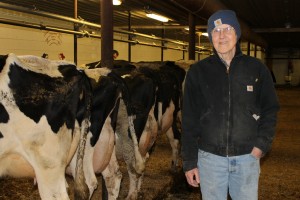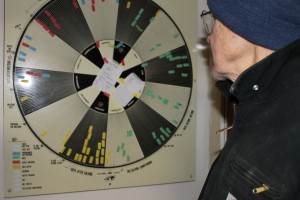Northern Lights Dairy is a return to milk producers long gone
March 12, 2013

Nancy Tarnai
907-474-5042
3/11/13
Although dairy farming has a rich history in Alaska, hailing back to at least 1867, there are less than a handful of commercial operations existing today.
In that light, it seems incredible that in 1959 the state boasted 525 farms and milk accounted for 49 percent of agricultural products.
One farm that keeps on keeping on is Northern Lights Dairy in Delta Junction. Don and Lois Lintleman bought their farm with a tiny trailer and a storage building in 1970. Over the years, the family has built up their property to include houses, barns, storage facilities and immaculate grounds.
The couple moved north from Wisconsin, where they had a small farm. They had vacationed here in 1968. “My husband always wanted to come to Alaska and homestead,” Lois said. “We bought this place instead.”
Northern Lights is home to over 100 Holstein and Jersey cows. Helping make the operation successful are three sons and a herdsman, who are kept busy processing and distributing milk to three military bases and three Safeway stores. They produce half-gallon and three-gallon cartons of vanilla, chocolate and strawberry ice cream and sell a base mix for soft serve ice cream. In Fairbanks, the ice cream is available at Alaska Feed and Curry’s Corner.
“We go from the cattle to the consumer,” Lois said.
Freshness is their best advantage, Don said. “What comes from Seattle takes longer and it’s ultra-pasteurized and really different from what we have.”
The key to making it happen is simple, Lois explained. “It’s lots of hard work.” To keep things in the black, Don worked at Fort Greeley the first 14 years and Lois continued her job at the local IGA until last year. Lois’s advice for running a profitable farm is to not spend money foolishly.
The Lintlemans raise barley, hay, peas and oats. They add hay silage concentrates from Wisconsin to ensure the animals are getting all the minerals and protein they need.
The farm is not without its challenges. “Getting parts you need you’d just as well be on the moon,” Don said. For example, he recently ordered a milk testing machine that measures butterfat, protein and water. “I tried for months to get it here and get it hooked up,” he said.
Keeping employees is another challenge, Don said. Apparently, milking twice a day isn’t for the faint of heart.
Although the Lintlemans use no hormone shots on their cows, they need commercial fertilizer to produce the hay, so the farm can’t be labeled organic.
The cows are milked for 305 days, then given a rest period. Most produce milk for four to five years. After that they are usually sold to Delta Meat and Sausage for hamburger. “If they’re not producing much they become roasts and burger,” Don said.
The cows are bred by artificial insemination so there is no need for bulls. Male calves are sold to 4-H and FFA students for the market steer program.

Interestingly enough, Northern Lights operates without computers. “We do everything by hand,” Don said. “We keep a close touch with our animals.”
Asked what is the best thing about farming, Don said succinctly, “You’re your own boss. That’s about as far as it goes.”
He worries about the state of agriculture in Alaska and about food security. “We used to have more people in farming.”
Even in his own family, with seven grandchildren, only one is interested in the farm. A 10-year-old grandson from Anchorage loves to help his grandparents, rising eagerly before 4:30 a.m. for the first milking.
“I would like to expand but I’m holding off to see what is going to happen,” Don said.
Contact information: 907-895-4824
This column is provided as a service by the ĐÔÓűÉç School of Natural Resources and Agricultural Sciences and the Agricultural and Forestry Experiment Station. Nancy Tarnai is the school and station’s public information officer. She can be reached at ntarnai@alaska.edu.


